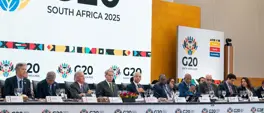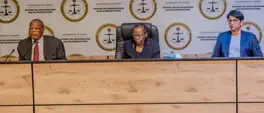MALAIKA MAHLATSI: Trump’s WHO withdrawal is an act of self-sabotage and misguided patriotism
Malaika Mahlatsi
22 January 2025 | 7:12Curiously, while Trump sees the withdrawal as an act of cementing US power, it achieves the opposite, writes Malaika Mahlatsi.
On his first day in office, United States (US) President Donald Trump signed an executive order withdrawing the country from the World Health Organization (WHO).
This is the second time that Trump has withdrawn from the largest inter-governmental health organisation at an international level.
During his first presidency, Trump submitted a letter to the Secretary-General of the United Nations, António Guterres, stating the US’ intention to withdraw. The letter of intent, submitted during the COVID-19 pandemic that occurred just before the end of his term, cited what he deemed the organisation’s failure to institute much-needed reforms.
Trump also denounced the US’s contributions to the WHO in comparison to China’s. He had on multiple occasions accused the WHO of aiding China in allegedly covering up the origins of the virus, thereby allowing it to spread.
The US immediately stopped making payments to the organisation, though a withdrawal did not happen owing to the retraction of the letter six months later by former president Joe Biden on his first day in office.
On Monday, Trump revoked the order, putting in motion the withdrawal of the US, which could take up to a year. The decision is being challenged by various individuals and organisations, with the WHO Center director and chair of global health law at Georgetown University, Professor Lawrence Gostin, publicly stating that he would challenge it in court.
In the recent order, Trump has directed the Secretary of State and the Director of the Office of Management and Budget to take appropriate measures to: (i) pause the future transfer of any US government funds, support, or resources to the WHO; (ii) recall and reassign US government personnel or contractors working in any capacity with the WHO; and (iii) identify credible and transparent US and international partners to assume necessary activities previously undertaken by the WHO.
Section 3 of the order, which speaks to global system negotiations, states that while the withdrawal is in progress, the Secretary of State will cease negotiations on the WHO Pandemic Agreement and the amendments to the International Health Regulations.
Significantly, it states that actions taken to effectuate such agreements and amendments will have no binding force on the US.
Public health experts have raised concerns about the decision, arguing it places the US in danger. Dr Michael Osterholm, the director of the Center for Infectious Disease Research and Policy at the University of Minnesota, is quoted in a Time article titled “What Leaving the WHO Means for the U.S and the World”, saying: “We in the U.S don’t experience many of the infectious diseases we see around the world in large part because they are stopped in these countries, oftentimes through the support and coordination of the WHO. Funding the WHO is about investing in our own health here in this country.”
It is a sentiment shared by many in the public health and global health space. With the first withdrawal attempt in 2020, the heads of the American Medical Association, American Academy of Pediatrics, American College of Physicians and the American Academy of Family Physicians released a joint statement condemning the decision, arguing it put the health of Americans at grave risk.
Their arguments are correct. Trump’s decision to withdraw from the WHO and cut funding is a strategic miscalculation and potentially disastrous action for the US and the rest of the world.
The US is the largest donor of the WHO, primarily through voluntary, project-based funding. Without this funding, which mainly benefits developing countries in some of the poorest regions of the world, many public health initiatives will have to be halted.
In addition to this, the US offers extensive technical expertise to the WHO, with many American experts seconded to the organisation by the US government. Without their much-needed expertise, the tracking, prevention and management of epidemics and pandemics will be that much more difficult.
This is happening at a time when research indicates that the frequency and severity of pandemics are on the rise.
According to researchers at the Harvard T.H. Chan School of Public Health, another pandemic is most certainly coming. In an article titled “The Next Pandemic: Not if, but When”, five faculty members of the institution concur with growing research findings that indicate that the world will experience another global health pandemic similar to the COVID-19 pandemic.
This aligns with a study analysing novel disease outbreaks over the last 400 years, titled “Intensity and frequency of extreme novel pandemics” published in the Proceedings of the National Academy of Sciences, which shows that the risk of intense outbreaks is growing rapidly.
As stated by Dr Osterholm, the decision has a direct impact on the US’s own public health system, which is not only expensive but also dysfunctional.
This is elaborated on in a Harvard Health Publishing report by Dr Robert H. Shmerling, who contends that despite spending far more on healthcare than other high-income nations, the US scores poorly on many key health measures.
The COVID-19 pandemic also demonstrated that the US public health system is in a bad state.
Leaving the WHO is unwise for the country. Among other things, the WHO serves as a first alert system when new outbreaks occur. Without being part of the organisation, the US may not receive this information timeously, placing its own citizens at risk.
Furthermore, in such an interconnected world, the spread of viruses and diseases happens at the speed of light. The COVID-19 pandemic and other global pandemics illustrated this. The inability of the US to obtain the necessary information and cooperation threatens the efficiency of its own systems for responding.
Curiously, while Trump sees the withdrawal as an act of cementing US power, it achieves the opposite.
By defining itself outside the WHO rather than using its strength to negotiate for meaningful reforms, Trump is weakening his country’s ability to progressively influence the global health agenda.
And because nature abhors a vacuum, the space will be filled by the very China he is hellbent on weakening – alongside a Global South that is increasingly asserting its place in the world.
Thus, whether one looks at it in terms of global health threats or geopolitics, the withdrawal of the US from the WHO is not strategic. And this is the danger with leaders who make decisions based on vengeance and who reject reasoned advice when making decisions.
In the words of Pope Francis: “If you withdraw into yourself, you run the risk of becoming egocentric. And stagnant water becomes putrid”.
Malaika Mahlatsi is a researcher and geographer. She is a PhD in Geography candidate at the University of Bayreuth in Germany and recently completed the Introduction to Global Health short course at Stellenbosch University.
Get the whole picture 💡
Take a look at the topic timeline for all related articles.
















